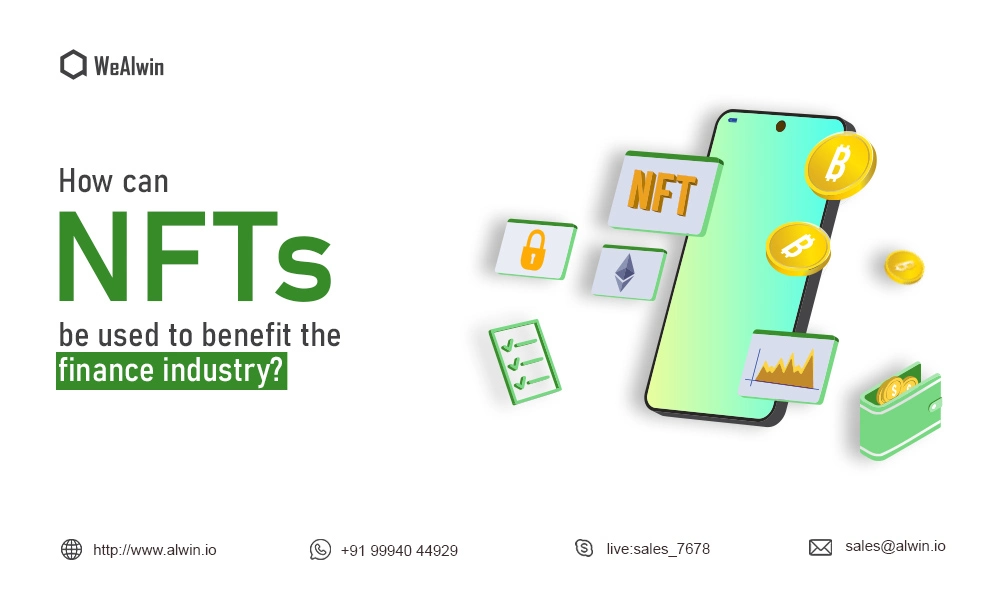In recent years, Non-Fungible Tokens (NFTs) have become a buzzword in the art and collectibles space, with people paying millions for digital art and collectibles. However, the potential of NFTs goes beyond just the art world; they can also have a significant impact on the finance industry. In this article, we will explore how NFTs can be used to benefit the finance industry.
What is NFT?
Before diving into the benefits, it is essential to understand what NFTs are. NFTs, or separate digital tokens, are stored on a blockchain. Unlike cryptocurrencies like Bitcoin or Ethereum, NFTs are not interchangeable, meaning that each one is unique and cannot be replicated. This uniqueness is what makes NFTs valuable and attractive to collectors and investors.
How can they be used to Benefit the Finance Industry?
The ability of NFTs to develop new revenue streams for businesses and individuals is one of their most important advantages. NFTs can be used to represent ownership of various assets, such as real estate, artwork, and other collectibles. By tokenizing these assets, individuals can sell fractional ownership of them, allowing more people to invest in them. This creates a new revenue stream for the asset owner, and the investors can benefit from the appreciation of the asset's value.
The finance industry can benefit from NFTs in several ways. One such way is by using NFTs to tokenize assets such as bonds and other securities. Tokenizing these assets can create a more efficient way of trading and settling securities, as it removes intermediaries and reduces costs. This can also make it easier for smaller investors to participate in the market, increasing liquidity and accessibility.
Another way is through the creation of unique financial products. For example, a financial institution could create an NFT that represents a basket of stocks or other assets. The NFT could then be traded on a secondary market, allowing investors to gain exposure to the underlying assets without having to buy them individually. This creates a new revenue stream for the financial institution and provides investors with a new way to invest in the market.
In addition to creating new revenue streams and financial products, NFTs can also be used to improve transparency and accountability in the finance industry. By using blockchain technology to store and track ownership of assets, it becomes easier to verify ownership and prevent fraud. This can create a more secure and trustworthy financial system, which can lead to increased investor confidence and participation in the market.
Furthermore, NFTs can be used to create new fundraising opportunities for companies. For example, a startup could create an NFT that represents ownership of a portion of the company. Investors could purchase these NFTs, providing the startup with much-needed capital to grow and expand. This creates a new way for companies to raise funds, which can be particularly useful for startups that have difficulty accessing traditional forms of funding.
Another way is by creating new opportunities for financial education and literacy. By tokenizing financial concepts and products, individuals can learn about investing and finance in a more interactive and engaging way. This can help to improve financial literacy, which can lead to increased participation in the market and improved financial outcomes for individuals.
Finally, NFTs can be used to create new ways to incentivize behavior in the finance industry. For example, a company could create an NFT that represents a share of the profits generated by a particular project. Employees who contribute to the project could receive these NFTs as a form of compensation, creating a new way to incentivize and reward employees for their work.
Consult with our business experts to know more about NFTs in Finance! Chat with us on WhatsApp
How can NFTs be widely used in Finance:
Standardization of NFTs:
Currently, there is no standard definition or protocol for NFTs. Different platforms use different standards, making it challenging to transfer NFTs from one platform to another. Standardization of NFTs would enable seamless integration with financial services, facilitating interoperability and compatibility between different systems. Standardization would also help to establish trust and credibility in the market and encourage mainstream adoption.
Regulatory Clarity:
As NFTs continue to gain popularity, regulatory authorities are starting to pay attention to their potential impact on the financial markets. NFTs present unique challenges in terms of ownership, valuation, and security, which need to be addressed through clear regulatory frameworks. Regulatory clarity would provide a clear path for financial institutions to incorporate NFTs into their operations and mitigate the risks associated with their use.
Enhanced Security Measures:
Security is a major concern in the financial services industry, and NFTs are no exception. NFTs require robust security measures to prevent fraud, counterfeiting, and hacking attempts. Blockchain technology, which underpins NFTs, provides a high level of security. However, it is not foolproof, and additional measures such as multi-factor authentication and encryption may be necessary to enhance security.
Increased Liquidity:
Liquidity is essential for any asset to be widely adopted in the financial services industry. NFTs are no exception. The ease of buying and selling an asset without having an impact on its price is referred to as liquidity. NFTs are currently illiquid, meaning that it is challenging to sell them without affecting their value. Therefore, platforms need to develop mechanisms that enable buyers and sellers to trade NFTs without affecting their value.
Improved User Experience:
User experience is critical to the widespread adoption of any technology. NFTs need to be easy to use, navigate, and understand for users to adopt them. Currently, the process of buying and selling NFTs is complex, requiring technical expertise and a deep understanding of the underlying technology. Therefore, platforms need to develop user-friendly interfaces that simplify the process of buying and selling NFTs.
Why choose us?
Unlock the potential of NFTs in the finance industry with WeAlwin Technologies! Our innovative blockchain-based platform enables you to create, store, and trade NFTs as a secure digital asset for a myriad of financial uses. With WeAlwin's NFTs, you can securely transfer ownership, make payments faster and easier, enhance security, and quickly trade tokens on any exchange. Take the leap into the future of finance with us!
In conclusion, NFTs have the ability to completely change the financial sector. By creating new revenue streams, financial products, and fundraising opportunities, NFTs can help to improve the efficiency and accessibility of the market. WeAlwin Technologies provides many services with cutting-edge features.



